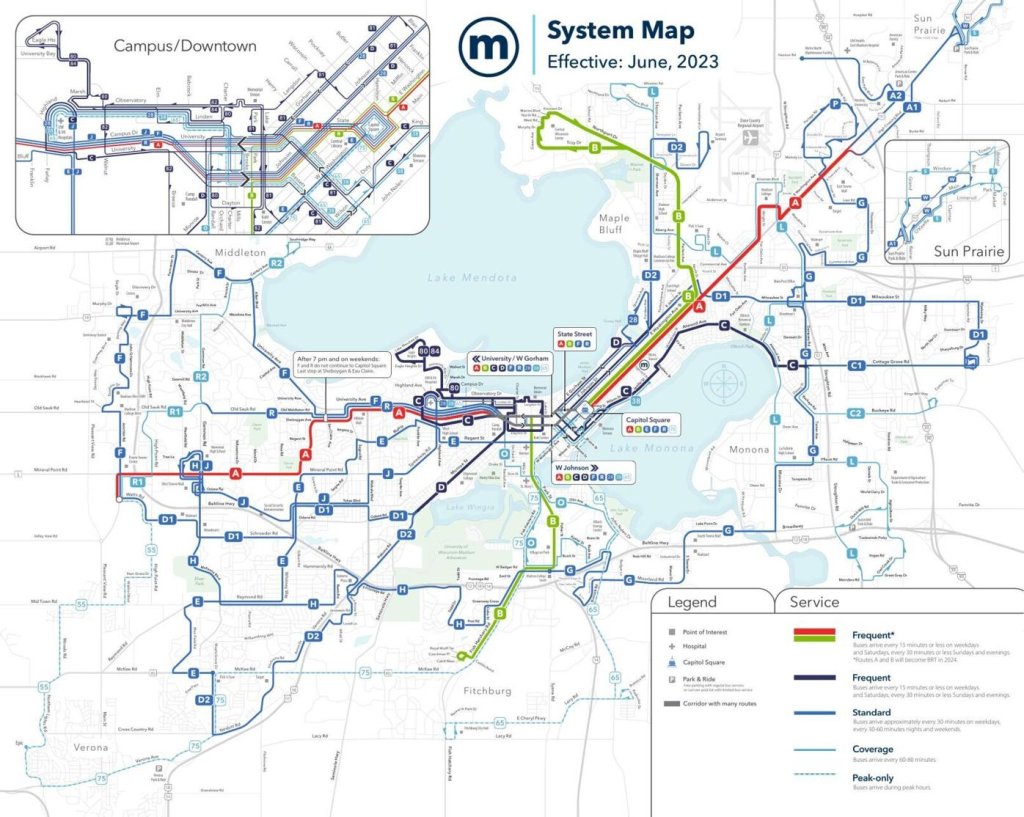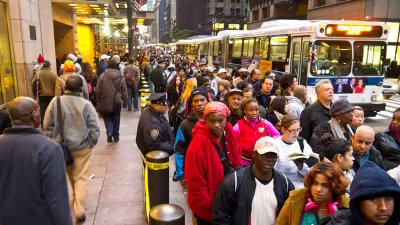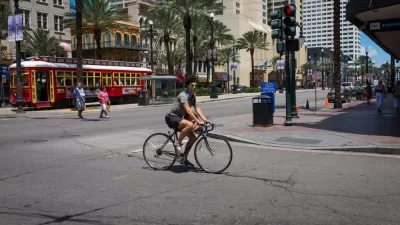Transit riders in Madison, Wisconsin are navigating an entirely new system this week.
Metro Transit in Madison, Wisconsin launched redesigned transit service on June 11—the city’s first transit system redesign in 20 years.
“The city says the changes are meant to shorten commutes and simplify routes,” reports Grace Ulch for WKOW. “The biggest changes riders should expect - many route numbers have changed to letters, new bus stops have been added and Metro's north, east and west transfer points are now closed,” ads Ulch.
A separate article by Allison Garfield for Cap Times, published in May, provides additional details about the system redesign.
“The new bus redesign promises more consistent service with direct routes to outlying areas and the elimination of transfer points and buses from lower State Street,” writes Garfield. “The expansion will include three new routes to Sun Prairie. Bus rapid transit — a completely separate project that is slated to start in the fall of 2024 — will serve as the backbone going east to west and north to south.”
According to both articles, transit users in Madison have expressed concerns about the changes, with officials and some riders disagreeing on the effects of the changes for low-income riders and those with disabilities. According to Garfield, “residents have raised concerns that the system puts a disproportionate burden on low-income riders, people with disabilities and marginalized communities.”
Metro Transit’s General Manager Justin Stuehrenberg claims the opposite is true, however. “On average, Black residents will see a 96% increase in access to jobs within a 45-minute ride, Stuehrenberg said at the Thursday press conference, and for Latinx residents, that number jumps to 120%. Low-income residents will see a 93% increase.”
Newly hired “Ride Guide” staff have been on hand to help the public navigate the redesigned system, according to a city press release.
The Madison City Council first approved the new transit system design in June 2022, but full approval, in December 2022, had to wait until the city completed a Title VI evaluation.

FULL STORY: 'It's a positive change for us': Metro transit system gets its first major redesign in 20 years

Planetizen Federal Action Tracker
A weekly monitor of how Trump’s orders and actions are impacting planners and planning in America.

Congressman Proposes Bill to Rename DC Metro “Trump Train”
The Make Autorail Great Again Act would withhold federal funding to the system until the Washington Metropolitan Area Transit Authority (WMATA), rebrands as the Washington Metropolitan Authority for Greater Access (WMAGA).

The Simple Legislative Tool Transforming Vacant Downtowns
In California, Michigan and Georgia, an easy win is bringing dollars — and delight — back to city centers.

The States Losing Rural Delivery Rooms at an Alarming Pace
In some states, as few as 9% of rural hospitals still deliver babies. As a result, rising pre-term births, no adequate pre-term care and "harrowing" close calls are a growing reality.

The Small South Asian Republic Going all in on EVs
Thanks to one simple policy change less than five years ago, 65% of new cars in this Himalayan country are now electric.

DC Backpedals on Bike Lane Protection, Swaps Barriers for Paint
Citing aesthetic concerns, the city is removing the concrete barriers and flexposts that once separated Arizona Avenue cyclists from motor vehicles.
Urban Design for Planners 1: Software Tools
This six-course series explores essential urban design concepts using open source software and equips planners with the tools they need to participate fully in the urban design process.
Planning for Universal Design
Learn the tools for implementing Universal Design in planning regulations.
Smith Gee Studio
City of Charlotte
City of Camden Redevelopment Agency
City of Astoria
Transportation Research & Education Center (TREC) at Portland State University
US High Speed Rail Association
City of Camden Redevelopment Agency
Municipality of Princeton (NJ)





























